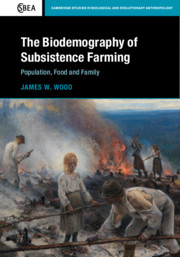Book contents
- The Biodemography of Subsistence Farming
- Cambridge Studies in Biological and Evolutionary Anthropology
- The Biodemography of Subsistence Farming
- Copyright page
- Dedication
- Contents
- Preface
- Part I Introductory Concepts
- Part II Macrodemographic Approaches to Population and Subsistence Farming
- 4 A Modicum of Demography
- 5 Malthus and Boserup
- 6 The Intensification Debate after Boserup
- Part III Microdemographic Approaches to Population and Subsistence Farming
- Appendix: A Bibliographic Essay on Subsistence Farming
- References
- Index
6 - The Intensification Debate after Boserup
from Part II - Macrodemographic Approaches to Population and Subsistence Farming
Published online by Cambridge University Press: 30 April 2020
- The Biodemography of Subsistence Farming
- Cambridge Studies in Biological and Evolutionary Anthropology
- The Biodemography of Subsistence Farming
- Copyright page
- Dedication
- Contents
- Preface
- Part I Introductory Concepts
- Part II Macrodemographic Approaches to Population and Subsistence Farming
- 4 A Modicum of Demography
- 5 Malthus and Boserup
- 6 The Intensification Debate after Boserup
- Part III Microdemographic Approaches to Population and Subsistence Farming
- Appendix: A Bibliographic Essay on Subsistence Farming
- References
- Index
Summary
In this chapter I hope to put some real-world flesh on the bare theoretical bones of Malthus and Boserup, especially the latter. Although Malthus and Boserup both drew upon empirical evidence in their writings, neither did the sort of long-term fieldwork on traditional farming that would satisfy a modern-day anthropologist. I have no wish or warrant to disparage their efforts at theoretical modeling – but the comparison of model to reality is also important, not only to test the model for possible rejection but to suggest ways in which it might be improved or extended. It is worth emphasizing, however, that there is nothing to be gained by attempting to make any model perfectly realistic, even if that were possible, for to do so would be to make it too complicated to understand and would destroy its generalizability. Even as we complicate our model, we should still seek simplicity and generality: we still want the model to be a model. If complications are to be added, they should be important complications – things that significantly increase our understanding, not just things that improve the fit of the model ex post facto to a particular set of field observations or that merely satisfy an esthetic preference for holism or complexity.
- Type
- Chapter
- Information
- The Biodemography of Subsistence FarmingPopulation, Food and Family, pp. 204 - 246Publisher: Cambridge University PressPrint publication year: 2020

